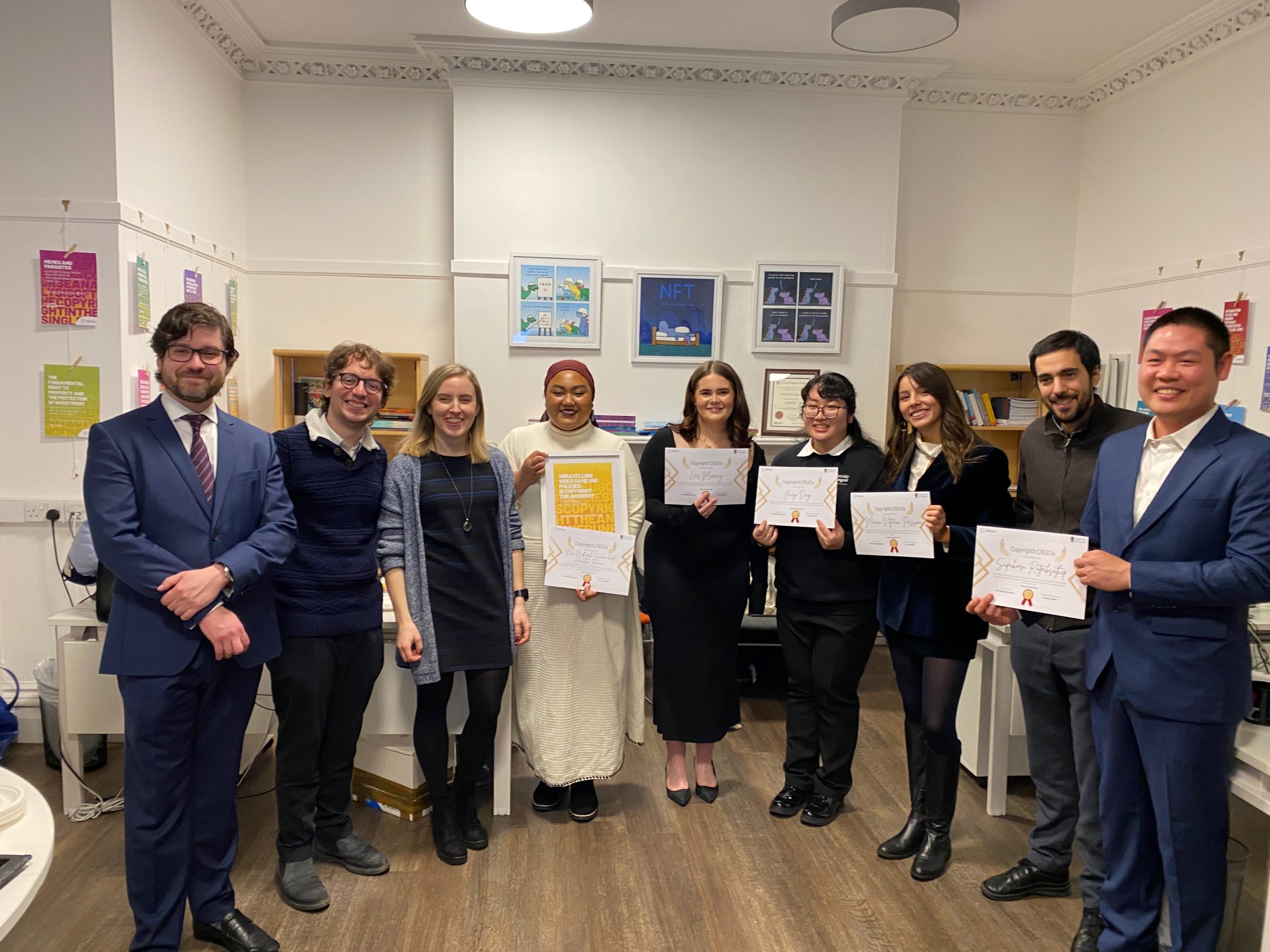In the blink of an eye, it is December again, and the University of Glasgow’s graduates are heading into the Bute Hall to pick their hard-earned diplomas. On 4th December it was the turn of the School of Law students. Members of the CREATe team were happy to partake in the celebrations and toast our excellent IP LLM students during a small gathering in the CREATe offices.

CREATe leads the LLM in Intellectual Property & Digital Economy, offered by the Law School at the University of Glasgow. The programme provides students with a unique opportunity to explore the rapidly developing digital environment through the lens of intellectual property, and to engage with the current policy discussions in which CREATe remains an active participant. All IP LLM students are required to submit a master dissertation on the topic of their choosing. They work on their dissertations independently, under a limited guidance of a supervisor.
Since 2021, CREATe offers authors of excellent postgraduate research an opportunity to publish their LLM dissertations in the CREATe Working Papers series. The “Outstanding LLM Dissertations” allow us to showcase the best work of our LLM students, reward their efforts, and inspire our new students when preparing their own dissertations in the future.
Following nominations by the IP LLM supervisors, the CREATe teaching team has selected two LLM dissertations submitted in the 2022/23 academic year to be published in the Working Paper series. The authors of the outstanding dissertations are:
Nadhirah Syahmi Zawawi: Unravelling video game UGC policies: is copyright the answer?
Francisco Javier Alcaraz Martinez: Fame, Artistry and the Law: A Dual Jurisdiction Evaluation of Publicity Rights in Video Games
We are excited to bring these two excellent pieces of research to the wider academic community. You can read the abstracts and access the full text of the Outstanding LLM Dissertations 2023 below.
In our celebrations at CREATe offices we were joined by the alumni of CopyrightX, an affiliated Harvard Law School course, which allows our IP LLM students to deepen their understanding of US copyright law. Students received their diplomas and warmest congratulations from the CREATe team.
Once again, many congratulations to Nadhirah, Francisco and all students who graduated yesterday!
Unravelling video game UGC policies: is copyright the answer?
Nadhirah Syahmi Zawawi
CREATe Working Paper 2023/12
Abstract
This thesis concerns the gap in the law within the copyright legal framework when concerned with user generated content (UGC). In order to illustrate this, this thesis first sets out academic discourse on the categorisation and criteria of UGC, followed by existing legal instruments attempting to regulate UGC. This thesis then identifies the gaps that have yet to be regulated within the law. Notably, this thesis identifies that there are no legislative instruments that concern the recognition and ownership of UGC, nor are there any legislative instruments regarding the rights conferred, if any, to the owner of UGC.
This is followed by examples of in game creation (IGC), a subset of UGC, within contemporary video games. This stands as the primary subject matter of this thesis. Having identified and provided examples of in game creations, this thesis then determines the owners of said IGC by delving into the video games’ UGC policies, which can be found in their EULA and User Account Agreement. We I find through this analysis that there are instances where the IGC is owned by the user, but this is consequently licensed back to the developer.
This thesis then identifies issues with current commercial practice of game publishers in their UGC policies including the presumptuous treatment of UGC as property, as evidenced by licensing clauses, and the presumptive categorisation of creations as UGC, which this thesis will elaborate, is a predetermination that results in creations not being able to justify copyrightability.
The penultimate chapter of this thesis will then answer the question of whether copyright might be the solution to the issues raised in the previous chapter, especially the tension between user and game publisher, and proposing alternative suggestions that may be worth further analysis in the future, including a potential neighbouring rights regime to address the status of UGC.
Fame, Artistry and the Law: A Dual Jurisdiction Evaluation of Publicity Rights in Video Games
Francisco Javier Alcaraz Martinez
CREATe Working Paper 2023/13
Abstract
This dissertation takes a deep dive into the intriguing connections between trademark law, image rights, and the ever-changing video game world. The video game industry has come a long way from simple graphics to immersive virtual experiences, with trademarks playing a key role in safeguarding brand identity. The use of celebrity images adds a touch of realism to games, and in the US, there are strong laws protecting against their unauthorised use. Examining this legal structure reveals that the interaction among trademarks, the protection of celebrity rights, and the cultivation of artistic expression hold significant significance. Innovations like the Rogers and transformative-use tests offer valuable perspectives on achieving this intricate equilibrium. This paper shifts its focus to the UK, where it explores how image rights are protected and how passing off plays a crucial role when specific publicity rights are lacking. This sets the stage for a comparison with the US approach, where it delves into the complexities of UK image rights protection. Additionally, this dissertation also demonstrates that privacy regulations and acts pertaining to data protection have augmented the rights of individuals within this domain.
Finally, this paper brings together the pieces of the puzzle and proposes the need for a new publicity right tort in the UK. This becomes especially important as advanced video games become more prominent, raising questions about how identity rights are respected. Drawing inspiration from the US and innovative legal tests, it explores how a new tort could balance the freedom of expression with image rights.
It also peeks into the future, analysing current challenges like user-generated avatars and AI-generated content, which could make unauthorised likeness usage a concern. This study emphasises the pressing need to modernise the UK’s strategy concerning image rights through a more profound comprehension of the intricate connections between trademark law, image rights, celebrity likenesses, and the realm of video games.






